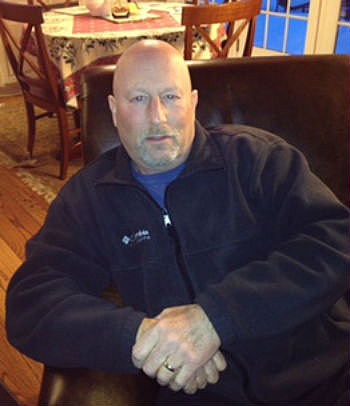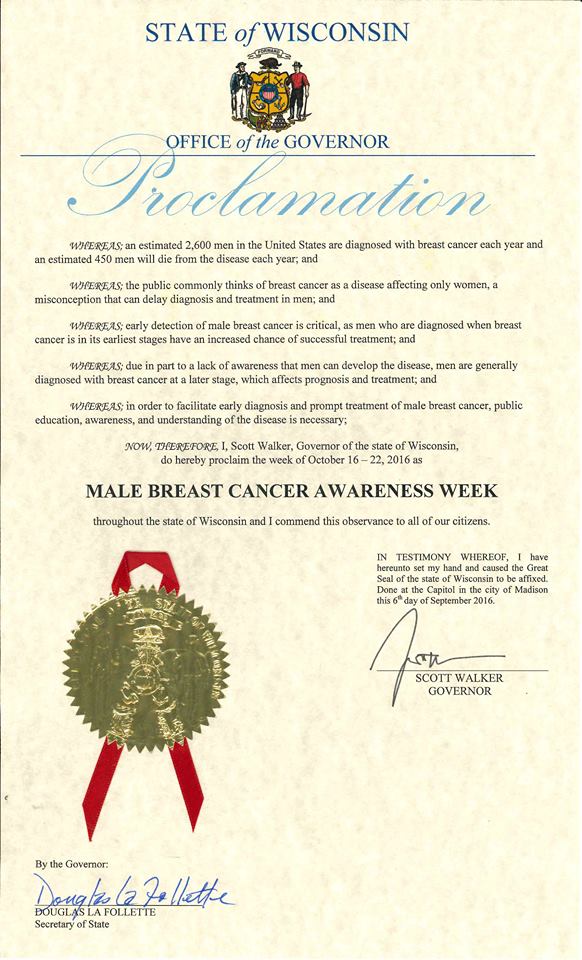Editor’s Note: We are re-posting Bill Rotter’s entry in honor of Breast Cancer Awareness Month. It also coincides with an important time in Bill’s home state of Wisconsin; it is Male Breast Cancer Awareness Week from October 16-22, 2016. Bill was kind enough to update his piece to help raise the profile of men with breast cancer.
Cancer is a difficult and tricky disease that tries to destroy us, but now we are better prepared to fight back due to a stronger understanding of the disease.
Cancer does not discriminate. As a male, the day I learned I had breast cancer was one of total disbelief and overwhelming shock. A diagnosis I was not prepared for. Sure, I knew men could get breast cancer… but not me! I knew of no history of male breast cancer in my family, although many people in my family had died of various cancers.
My story is probably not unlike that of others who discover they have breast cancer. I noticed a small lump in my right breast and realizing after about three weeks that it wasn’t going away, I finally said something to my wife. Fortunately for me, my wife had recently spent several years working on the development side of a non-profit agency that specializes in helping anyone going through the breast cancer journey, so after feeling my lump, she insisted that I see my doctor as soon as possible.
The next day I made an appointment to see my internist. This is when my life began to change forever. This short meeting led to a mammogram scheduled a week later. There is little chance a man will ever feel comfortable in a women’s clinic, which resulted in one of the most challenging experiences of my life (read my separate post about that here).
My mammogram was immediately followed by an ultrasound, then a biopsy the following week. The day after the biopsy, December 3, 2013, the telephone call came from the radiologist informing me of what I tried to prepare myself for, that I had breast cancer and my life would now take on a whole new twist.
I had so many questions and now wanted answers. I first notified my wife of the news. Then I had to find the courage to call my two sons, ages 22 and 24, who were living in different cities. As much as I would have preferred to have this conversation face-to-face, it just wasn’t possible. They all handled the news well and were overwhelmingly supportive.

The next step was for me to meet with my oncologist, radiologist, surgeon and a nurse navigator, and they all proved to be compassionate and sensitive to what I was experiencing. Many of my questions were answered, but I learned that there was little data known about male breast cancer, so my treatments would be similar to those for women with breast cancer. This added to my emotional stress, as I felt the makeup of men and women was very different; it confirmed what I had read – that male breast cancer was an “orphan cancer,” making up less than 1% of all breast cancers.
My treatment included a mastectomy of my right breast, followed by the removal of lymph nodes, to determine if the cancer had spread (finally a bit of good news, as all were clear). After that I underwent 5½ months of chemotherapy, followed by 6½ weeks of radiation. Needless to say, 2014 was a lap around the sun that I would like to forget. On the positive side, my recent July 2016 follow-up results indicate all is good at this time.
During my initial appointment, my oncologist asked questions about my family history and ancestry. When he learned that I was of Ashkenazi Jewish descent, he recommended that I undergo BRCA1/2 genetic testing. The results came back positive for a BRCA2 mutation.

Meeting with a genetic counselor and creating a family tree was an incredible experience for me. We were able to determine that the BRCA2 mutation came from my father’s side of the family. My father had seven siblings, four sisters and three brothers. My father, the oldest of the boys, died at 64 years old of prostate cancer and two of his brothers also died of prostate cancer. We were able to find out that two of my first cousins (they are sisters) had breast cancer, both diagnosed in their thirties. We also determined another male first cousin, whom I never met, died of breast cancer in his thirties.
Upon learning of my positive genetic test results, it was again time to make a difficult call to my sons to tell them about the risks associated with the mutation and how this could impact them. I also felt an obligation to write letters to about 30 cousins scattered throughout the United States, to let them know about my genetic test results. It was then up to each of them to make their own decision about genetic testing, but I always remained open to talking to them.
I recently stepped back from my business life to move into the next phase in my life, with the goal of creating awareness that men can and do get breast cancer, and more importantly that cancer itself has a genetic component. Many people are unaware of this, and I hope that by writing for this blog, I can help to achieve that goal.
In my state of Wisconsin, our governor proclaimed October 16-22, 2016 as Male Breast Cancer Awareness Week. Check into it – there may be similar weeks in your area as well.



